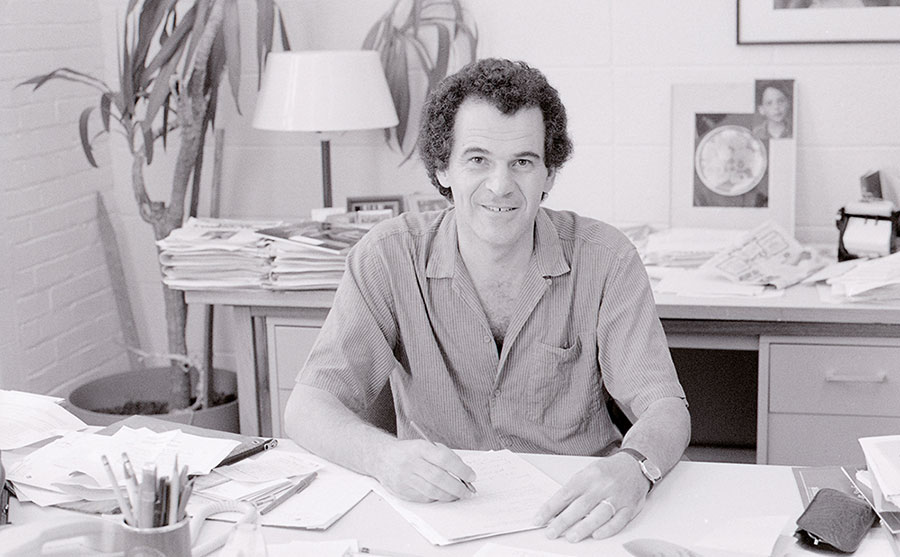Colleagues, students laud a model professor
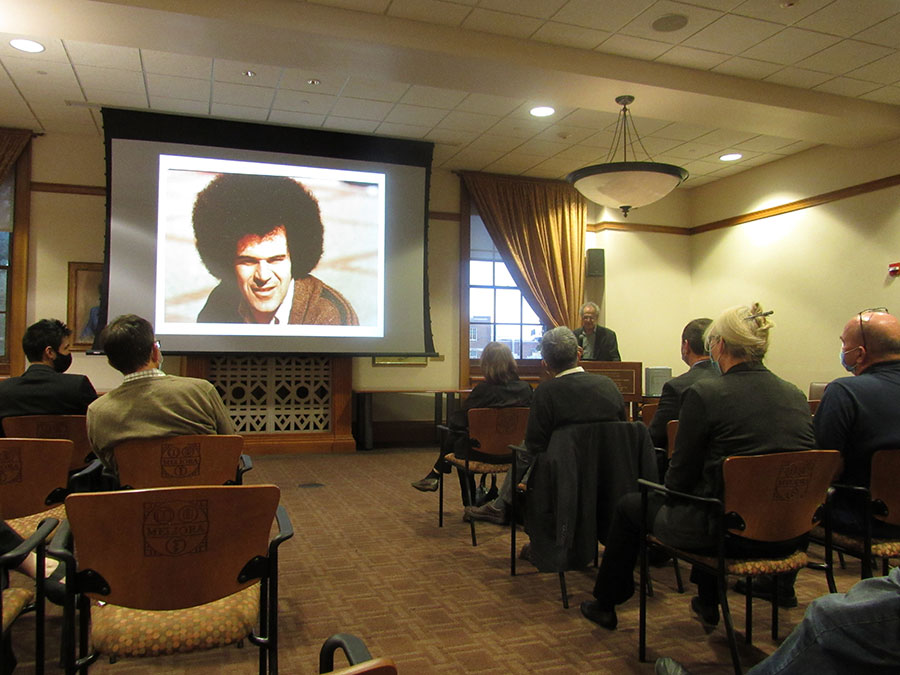

Colleagues and students gathered in the Hawkins Carlson Room of Rush Rhees Library on November 17, 2021, to pay tribute to Jacob Jorne, professor of chemical engineering, and hear him reflect on his career.
Jacob Jorne retires after 49 years—39 at Rochester—as a professor of chemical engineering
When Evan Granite ’94 PhD is asked by students how to select a PhD advisor, he tells them about his own mentor.
“I tell them that all of the professors are smart; most are demanding; and that they should choose an advisor who gets along well with his students and colleagues; gets students out in a reasonable amount of time; is highly productive; and is a good human being—in other words, someone just like Professor Jacob Jorne,” says Granite, a senior technical advisor for US Department of Energy Headquarters and adjunct professor of chemical and petroleum engineering at the University of Pittsburgh.
Other former students and colleagues shared similar sentiments when learning of Professor Jorne’s retirement. Their accolades and fond memories run the gamut, citing the important things he has accomplished as a researcher and mentor, but also the personal qualities that make him a joy to be around.
For example:
“Jacob has had an outstanding career as an electrochemist,” says Mitchell Anthamatten, professor and chair of chemical engineering. “I’m pleased that he will stay active as Professor Emeritus. I have always appreciated Jacob’s honesty and his commitment to the betterment of our department.” Anthamatten also marvels how Jorne, at seminars or faculty meetings, would “derive transport models or proofs on the back of napkins to validate his understanding of a concept.”
“Jacob has been a very effective faculty member, a strong defender of both his colleagues and the department within the university community,” says Eldred Chimowitz, a fellow professor in the department. “He has also proved to be an excellent, intuitive scientist for which he has been recognized in the field of electrochemistry with the prestigious Carl Wagner Award.” Jacob can also be a lot of fun to be around, Chimowitz adds. “His sense of humor is non pareil. He is a natural comic, razor-witted, with insights into people and the world around him which, to excuse the pun, have sometimes gotten him into hot water.”
Yeong-Jyh Tom Lii ‘88 PhD, who came from Taiwan to earn his doctorate here, says he considers himself “very lucky to have worked with Professor Jorne during the first five years of my student life in the U.S. Professor Jorne gave me an exciting opportunity to work in a brand new research field: semiconductor processing from a chemical engineering perspective.” But Lii, who retired recently from Texas Instruments, also appreciates how “Professor Jorne and his wife Judith Love invited me to many of his family’s important events. These gatherings helped me become familiar with American family life and culture,” Lii says. And to this day, he fondly remembers Jorne’s “famous words to all his students: ‘Time is running out!’”
Michal Vakrat Wolkin ‘00 PhD, an investor, director, and business leader in Israel, recalls the “aha!” moment she shared in the lab with Jorne when she first discovered green light emission from porous silicon. Equally, important to her, though, was Jorne’s hospitality and caring, which made “working with him always feel like home away from home.”
In much the same vein, Granite was inspired to hear Jorne talk about “cold fusion” to a “packed and rapt lecture hall of students and faculty members.” In a different vein, he also remembers being invited to Jorne’s home for a Passover Seder and delicious matzo ball soup—“which was greatly appreciated by a hungry and lonely graduate student.”
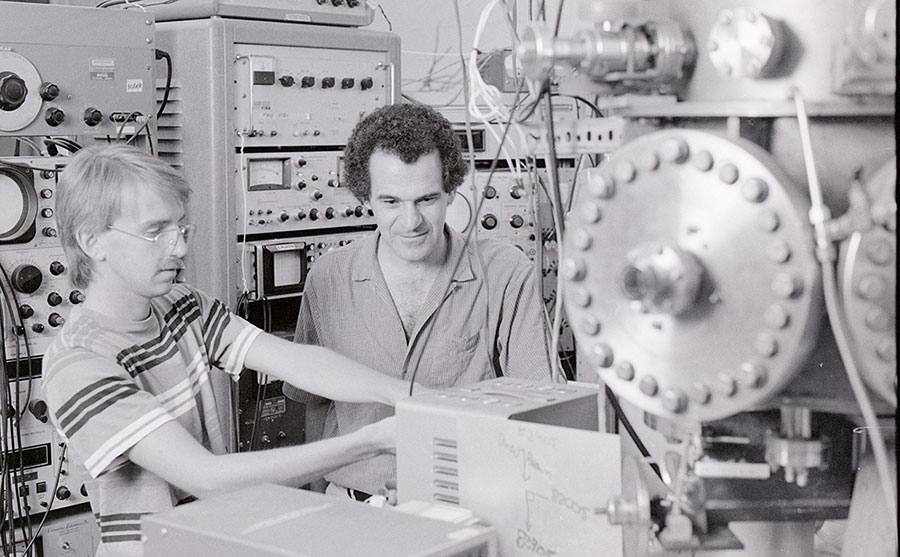
A ‘joyous’ approach to research
A native of Israel, Jorne received his bachelor's and master's degrees from the Technion, Israel Institute of Technology. He demonstrated his excellence as a researcher early on, while earning his PhD at University of California, Berkeley in the lab of Charles Tobias, the “father of electrochemical engineering.”
Jacob takes special pleasure in his memories of his studies at Cal Berkeley, amidst the excitement of the Civil Rights Movement and the anti-war activism during the Vietnam War. He let his hair grow into an ‘Afro’, larger than a basketball, for which his visiting mother never forgave him. His excitement at Berkeley went beyond all the famous activism.
He also found working in his lab gratifying as a young scientist, as it was the same lab of the Nobel Laureate, Glenn Seaborg, who discovered plutonium in that room. Jacob likes to quote Seaborg when he was asked what was his most exciting career achievement and he answered “well, the Nobel Prize was exciting, but having an element on the Periodic Table named after me is for eternity.”
Another significant memory is serving as TA to Professor Thomas Sherwood, the most distinguished chemical engineer after whom the Dimensionless Sherwood Number is named.
Jorne’s thesis, “The Electrochemical Behavior of the Alkali Metals in Propylene Carbonate,” helped pave the way for development of lithium and lithium ion batteries, work that continues today and assumes increasing significance as we work toward a greener planet.
He joined the faculty at Rochester after teaching for 10 years at Wayne State University, in Detroit. While there, in a city devoted to engineering, Jorne was awarded Engineer of the Year by the Detroit chapter of AICHE. He left Detroit to come to the University of Rochester where he became committed to his new department.
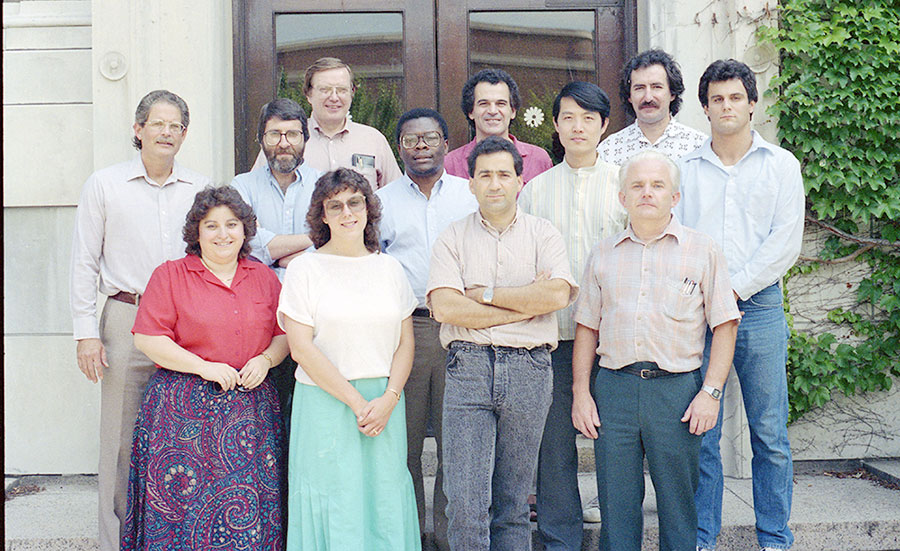
That commitment was clearly demonstrated after University President Thomas Jackson announced his 1995 Renaissance Plan to create a leaner, refocused College of Engineering, a plan which included suspending the PhD program in CHE and three other departments. Jorne was prominent in contributing to steering his Department back to its significant standing among all universities offering a chemical engineering major.
Under the Renaissance Plan, core faculty for the department shrank from 12 to four, with only Jorne, Chimowitz, Shaw Chen, and David Wu remaining to mentor a wave of new faculty who were subsequently hired after the suspension was lifted.
In addition to his work with lithium ion batteries, Jorne’s early research also involved the development of flow batteries, which are continually fed with fuel and used today in electric cars and for storage of energy in power plants. For this work he earned the Research Award of the Battery Division of the Electrochemical Society in 1989.
The Carl Wagner award he received in 1995 is an international award, granted by the Electrochemical Society to scientists who have made seminal contributions to their field within electrochemistry. Jacob’s contributions have been with both lithium and flow batteries, important to this day. He was the first to use propylene carbonate as a non-aqueous solvent and it is currently used in lithium-ion batteries.
Jacob’s studies sometimes led him far afield, including subjects like the stability of ecosystems, fractal analysis of roughness evolution during the electrodeposition of lithium and other subjects. He also briefly explored the possibility of "cold fusion"—conducting experiments that looked for neutrons and other products of a nuclear reaction in an electrochemical cell. Though the drama surrounding “cold fusion” ended quietly and with disappointment, Jorne never regretted his work in this area as “taking risks amid speculation often results in a burgeoning new and important field”.
Both Anthamatten and Granite use words like “joyous,” “curious,” “playful” and “creative” to describe Jorne’s approach to research. And the excitement he conveyed about the process of discovery was infectious. Jorne’s lecture on cold fusion, for example, inspired Granite to scribble down some ideas on fusing hydrogen by chemical pumping of deuterons using inexpensive solid electrolyte cells and palladium catalyst/electrodes. “Although my brief attempts to achieve a ‘mini-star’ in a cheap solid electrolyte tube did not work,” Granite says, “I will always remember the enthusiasm and encouragement by Dr. Jorne...to think big and be willing to fail.”
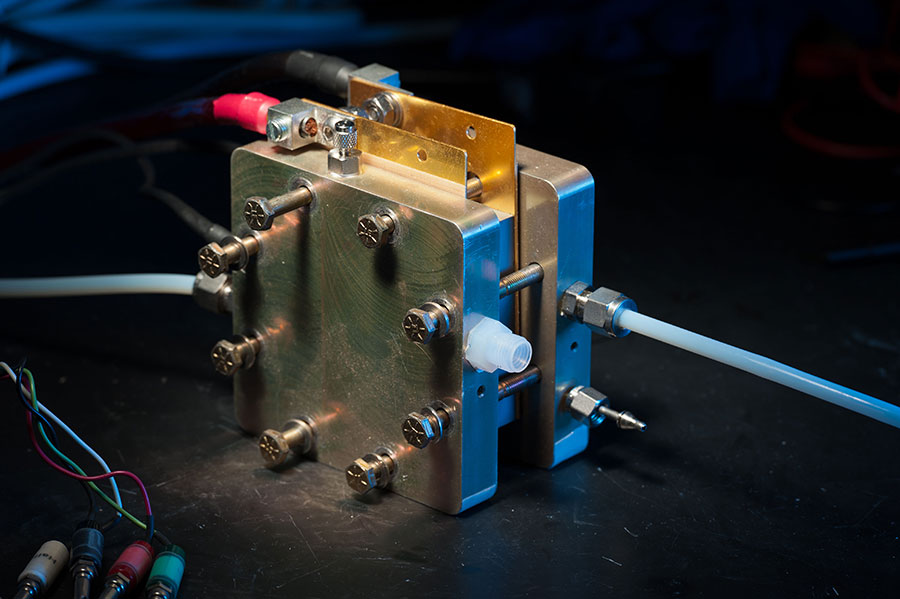
More recently Jorne’s research group collaborated with General Motors on the development of hydrogen PEM fuel cells for electric vehicles. His group also worked on the research and development of a zinc-redox flow battery for the storage of electrical energy and nano-charge transfer in the lithium-ion battery.
Jorne’s legacy as a researcher includes more than 200 papers and four patents. His legacy as a teacher includes at least 2000 students and as an advisor, 15 Master’s students and 28 PhD students. In fact, the last of his students is still working toward his PhD at Argonne National Lab.
His most satisfying achievement: mentoring
Jorne’s passion extended from the lab to the classroom.
Throughout his time here, Anthamatten says, Jorne “masterfully delivered numerous original and thought-provoking ‘chalk-talks’ to students, with lecture material that is deeply marinated in core chemical engineering principles. Jacob’s understanding of transport phenomena is ‘second to none.’”
Jorne taught courses in transport phenomena, separation processes, thermodynamics, semiconductors and microelectronics, and electrochemical engineering of batteries and fuel cells. He considers the teaching and mentoring of more than two thousand students—helping them to become productive chemical engineers—as his most satisfying professional achievement.
To Jorne’s students, his mentorship remains a cherished experience. “Words can’t express the gratitude I feel when I think about what Professor Jorne has done for me,” Lii says.
Wolkin still keeps in touch with her mentor. “Jacob always congratulates me on any career achievement; it still feels like he is my proud dad,” she says “and I love it when he listens to my podcasts and sends feedback and sweet comments.”
It becomes apparent to anyone who looks into Jorne’s career that he has touched many lives and his legacy will live on through students and faculty colleagues and through those whose research extends his own work.
